Related Research Articles
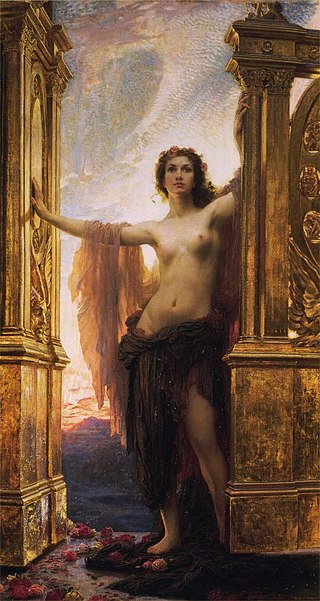
In ancient Greek mythology and religion, Eos is the goddess and personification of the dawn, who rose each morning from her home at the edge of the river Oceanus to deliver light and disperse the night. In Greek tradition and poetry she is characterized as a goddess with a great sexual appetite, who took numerous lovers for her own satisfaction and bore them several children. Like her Roman counterpart Aurora and Rigvedic Ushas, Eos continues the name of an earlier Indo-European dawn goddess, Hausos. Eos, or her earlier Proto-Indo-European (PIE) ancestor, also shares several elements with the love goddess Aphrodite, perhaps signifying Eos's influence on her or otherwise a common origin for the two goddesses. In surviving tradition, Aphrodite is the culprit behind Eos' numerous love affairs, having cursed the goddess with insatiable lust for mortal men.

In ancient Greek religion and mythology, Iris is a daughter of the gods Thaumas and Electra, the personification of the rainbow and messenger of the gods, a servant to the Olympians and especially Queen Hera. Iris appears in several stories carrying messages from and to the gods or running errands but has no unique mythology of her own. Similarly, very little to none of a historical cult and worship of Iris is attested in surviving records, with only a few traces surviving from the island of Delos. In ancient art, Iris is depicted as a winged young woman carrying a caduceus, the symbol of the messengers, and a pitcher of water for the gods. Iris was traditionally seen as the consort of Zephyrus, the god of the west wind and one of the four Anemoi, by whom she is the mother of Pothos in some versions.

Nut, also known by various other transcriptions, is the goddess of the sky, stars, cosmos, mothers, astronomy, and the universe in the ancient Egyptian religion. She was seen as a star-covered nude woman arching over the Earth, or as a cow. She was depicted wearing the water-pot sign (nw) that identifies her.

In Egyptian mythology, Sekhmet, is a warrior goddess as well as goddess of medicine.

Hathor was a major goddess in ancient Egyptian religion who played a wide variety of roles. As a sky deity, she was the mother or consort of the sky god Horus and the sun god Ra, both of whom were connected with kingship, and thus she was the symbolic mother of their earthly representatives, the pharaohs. She was one of several goddesses who acted as the Eye of Ra, Ra's feminine counterpart, and in this form she had a vengeful aspect that protected him from his enemies. Her beneficent side represented music, dance, joy, love, sexuality, and maternal care, and she acted as the consort of several male deities and the mother of their sons. These two aspects of the goddess exemplified the Egyptian conception of femininity. Hathor crossed boundaries between worlds, helping deceased souls in the transition to the afterlife.
Zulu traditional religion contains numerous deities commonly associated with animals or general classes of natural phenomena. Similar to some other religions, adherents of Zulu traditional religion believe in honoring ancestors (Amadlozi). Unkulunkulu is the highest god and is the creator of humanity. Unkulunkulu was created in Uhlanga, a huge swamp of reeds, before he came to Earth. Unkulunkulu is sometimes conflated with the sky god Umvelinqangi, god of thunder, earthquake whose other name is Unsondo, and is the son of Unkulunkulu, the Father, and Nomkhubulwane, the Mother. The word nomkhubulwane means the one who shapeshifts into any form of an animal. Another name given for the supreme being Unkulunkulu is uSomandla, the ultimate source of all existence. European settlers used the word Unkulunkulu in order to try to explain their belief in the God of the bible to the people of Zululand.
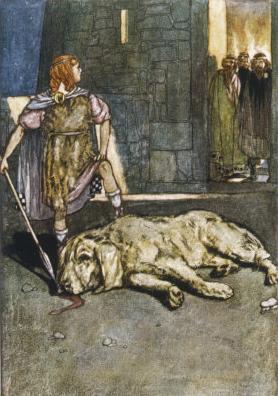
A demigod or demigoddess is a part-human and part-divine offspring of a deity and a human, or a human or non-human creature that is accorded divine status after death, or someone who has attained the "divine spark". An immortal demigod(-dess) often has tutelary status and a religious cult following, while a mortal demigod(-dess) is one who has fallen or died, but is popular as a legendary hero in various polytheistic religions. Figuratively, it is used to describe a person whose talents or abilities are so superlative that they appear to approach being divine.
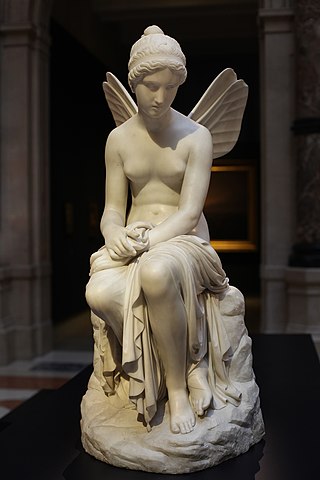
Psyche is the Greek goddess of the soul and often represented as a beautiful woman with butterfly wings. The name Psyche means "soul" in Greek and was commonly referred to as such in Roman mythology as well, though direct translation is Anima. She was born a mortal woman eventually granted immortality, with beauty that rivaled even Aphrodite, goddess of love. Psyche is known from the novel called The Golden Ass, also known as Metamorphoses, written by the Roman philosopher and orator Apuleius in the 2nd century. In the myth, she was given multiple trials in order to be with her beloved, Eros, also known as Cupid, god of physical love and desire and son of Aphrodite. The cultural influences of Psyche's story can be depicted in art dating back to the 4th century BCE.

The Eye of Ra or Eye of Re is a being in ancient Egyptian mythology that functions as a feminine counterpart to the sun god Ra and a violent force that subdues his enemies. The eye is an extension of Ra's power, equated with the disk of the sun, but it often behaves as an independent goddess. This goddess can be equated with several particular deities, including Hathor, Sekhmet, Bastet, Raet-Tawy, and Mut. The eye goddess acts as mother, sibling, consort, and daughter of the sun god. She is his partner in the creative cycle in which he begets the renewed form of himself that is born at dawn. The eye's violent aspect defends Ra against the agents of disorder that threaten his rule. This dangerous aspect of the eye goddess is often represented by a lioness or by the uraeus, or cobra, a symbol of protection and royal authority. The Eye of Ra is similar to the Eye of Horus, which represents many of the same concepts. The disastrous fury and rampages of the eye goddess and the efforts of the gods to appease her are a prominent motif in Egyptian mythology.

Latvian Lauma or Lithuanian Laumė, or Yotvingian Łauma is a fairy-like woodland spirit, and guardian spirit of orphans in Eastern Baltic mythology or Yotvingian mitology. Originally a sky spirit, her compassion for human suffering brought her to earth to share our fate.

Hittite mythology and Hittite religion were the religious beliefs and practices of the Hittites, who created an empire centered in what is now Turkey from c. 1600–1180 BC.
Venus is the name of two fictional characters appearing in American comic books published by Marvel Comics. The first, originally based on the goddess Venus (Aphrodite) from Roman and Greek mythology, was retconned to actually be a siren that only resembles the goddess. The second is stated to be the true goddess, who now wishes only to be referred to by her Greek name, Aphrodite. The similarities between the two characters are a point of conflict in the comics.
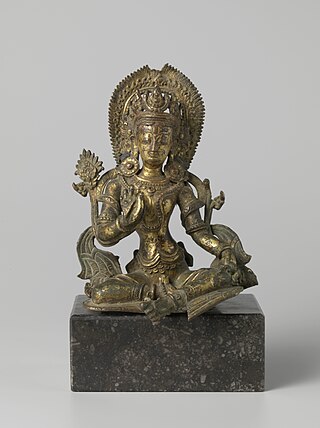
Indrani, also known as Shachi, is the queen of the devas in Hinduism. Described as tantalisingly beautiful, proud and kind, she is the daughter of the asura Puloman and the consort of the king of the devas, Indra.
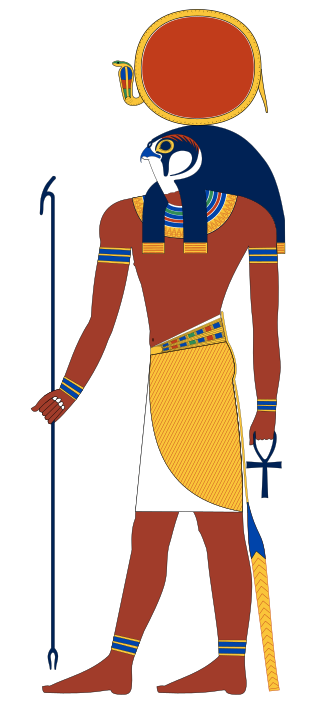
Ra or Re was the ancient Egyptian deity of the sun. By the Fifth Dynasty, in the 25th and 24th centuries BC, he had become one of the most important gods in ancient Egyptian religion, identified primarily with the noon-day sun. Ra ruled in all parts of the created world: the sky, the earth, and the underworld. He was believed to have ruled as the first pharaoh of Ancient Egypt. He was the god of the sun, order, kings and the sky.

Devī is the Sanskrit word for 'goddess'; the masculine form is deva. Devi and deva mean 'heavenly, divine, anything of excellence', and are also gender-specific terms for a deity in Hinduism.
Beer goddess may refer to:
References
- ↑ Hennig, Wanda. "Even the Spirits Need a Menu as a Zulu Goddess - Cuisine Noir Magazine". www.cuisinenoirmag.com. Archived from the original on 2016-09-10. Retrieved 2016-03-06.
- ↑ "Nomkhubulwane - Andries Botha - Artworks & Sculpture". andriesbotha.net.
- ↑ Conway, D. J. (2003). Magick of the Gods and Goddesses: Invoking the Power of the Ancient Gods. The Crossing Press. p. 208. ISBN 1-58091-153-6.
- ↑ Rogers, Lynn (2004). Edgar Cayce and the Eternal Feminine. Star Enterprises International. p. 22. ISBN 1-929841-02-7.